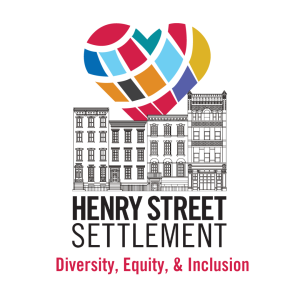Henry Street Settlement opens doors of opportunity for Lower East Side residents and other New Yorkers through social service, arts, and health care programs.
Henry Street Settlement’s DEI Committee Mission
To open doors for advancement and equity in our community through dismantling structural obstacles, candid and inclusive dialogue, and engaging in compassionate and intersectional advocacy.
What is DEI?
Henry Street’s DEI Committee is composed of staff members from across the agency who are committed to advocating for equity and belonging among our staff, clients, and community.
DIVERSITY is about recognizing and uplifting the ways in which people differ from one another, such as race, age, class, ethnicity, disability, sexuality, gender, housing status, criminal legal system involvement, and more.
EQUITY is about eliminating barriers by identifying and providing supportive resources in order to obtain full access for all people.
INCLUSION, or belonging, is the act of making space for people of all identities to be seen, heard, and respected.
Community Agreements
- Use “I” Statements
- One Mic + Honoring Time Agreements
- Said Here, Stays Here + Learned Here, Leaves Here
- Mindful Presence
- Respect and Honor Silence and Self Care
- Embrace Teachable Moments
- Embrace Discomfort
- Step Up, Step Back
- Expect and Accept Non-Closure

What is the Resistance Library?
The Henry Street Settlement Resistance Library is a free lending library dedicated to increasing knowledge and expanding access to books that promote diversity, equity, justice, belonging, and inclusion. In the wake of book bans in schools and libraries across the country, this library was created in order to challenge the idea that diverse voices and perspectives should be censored. Through this free library, we hope to provide an accessible way for anyone to learn and grow through the power of storytelling, while resisting the harms of censorship.
How do I check out a book?
1. Pick out a book at your reading level and mark what you took on the clipboard.
2. Enjoy your book! You can keep it as long as you’d like, but we recommend 3 weeks for check out.
3. When you’re done, return your book to our main library here at 301 Henry Street, New York, NY 10002
Want to learn more or access digital and audio books? Head over to our webpage: henrystreet.org/resistance-library
Grievance/Advocacy Statement
We, the DEI Committee, serve as a resource to support Henry Street Settlement’s compliance with federal/state laws and regulations and organizational policies prohibiting discrimination, harassment, retaliation, and ADA compliance by or towards any team member. Additionally, we avail ourselves to serve as advocates for any process, means, or protocols that would enhance Henry Street Settlement’s function as an inclusive and equitable institution, and thereby welcome any and all recommendations in service of this mission.


